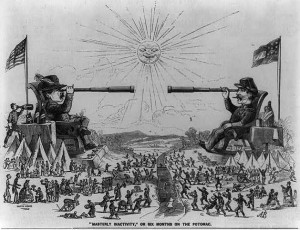Election of 1862
Posted By Brian Tomlin on November 5, 2012
Voter Rights and the Election of 1862

The slow progress of the war had many in the press and public feeling that the military was lazy, as shown in this political cartoon from 1862.
As we prepare for this year’s election day, it is enlightening to look back 150 years and see what the issues were in 1862. The mid-term elections in 1862 brought the Republicans serious losses due to sharp disfavor with the Lincoln Administration over its failure to deliver a speedy end to the war, rising inflation, high new taxes, ugly rumors of corruption, the suspension of habeas corpus, the draft law, and fears that freed slaves would undermine the labor market. Some of the most racist political campaigning in American history occurred during the 1862 elections over Lincoln’s issue of the Emancipation Proclamation which freed the slaves in Confederate territory.
A group of scholars at Michigan State University studying the election of 1862 have concluded that the 1862 elections had a direct influence on the way the civil war was fought, and more deeply in that they influenced the way all future elections were run and conducted.
Congressional Elections of 1862
House of Representatives.Lincoln’s Republicans lost 22 seats in Congress, while the Democrats picked up 28, for a net swing of 50 seats (or 27 percent) out of a total House membership of 185. However, the Republicans retained control of the House, in spite of falling from 59% of the seats to just over 46%, thanks to their alliance with the 25 Unionist representatives; the Unionists were a group of disaffected pro-war Democrats who broke with their party during the previous Congress.
Senate. The Republicans increased their control of the U.S. Senate. The Republican Party gained three seats, bringing their majority to 66% of the body. Also caucusing with them were Unionists and Unconditional Unionists. As many Southern states seceded in 1860 and 1861, and members left the Senate to join the Confederacy, or were expelled for supporting the rebellion, seats were declared vacant. To establish a quorum with fewer members, a lower total seat number was taken into account. As this election was prior to ratification of the Seventeenth Amendment, Senators were chosen by State legislatures instead of being elected directly by voters.
Fraudulent Voters
In 2012 there has been much discussion of possible voter fraud, with states passing or considering legislation to require photo identification and other measures. In 1862 the issues of voter fraud, immigration and draft dodging all influenced the voting in New York. On November 4, 1862 the New York Times published an article about the election:
“At every voting place in the City to-day a policeman will stand, all day long, with a list in his hand of the names of all persons who have sworn themselves to be aliens. If any man of this class presents himself to vote, he will instantly be arrested for having criminally attempted to evade the draft. There are seventeen thousand persons in the City who, in order to escape the draft, have sworn that they are aliens. It will not be safe for any one of these to be found interfering with the elective franchise. The result will be a quiet poll, and a considerable deficit in the Seymour vote.”
 ;
;


Comments